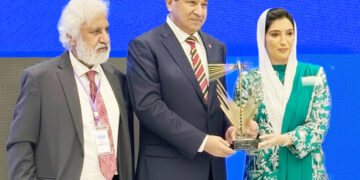Businesses and the general public distrust tax officials
Tax bureaucracy hinders the growth of the investment climate
Pakistan, May 2024: Dr. Muhammad Hanif Mughal, Chairman of Pakistan Tehreek-e-Shadbad, said on Sunday that the size of the undocumented economy is increasing rapidly in Pakistan, which is the failure of FBR.
He said the business community and the masses use all possible methods to avoid FBR because they do not trust this institution.
On the other hand, the tax authorities have never tried to reduce the distance from the taxpayers but have caused it to increase, which has hindered tax collection.
In a statement issued here today, Dr. Hanif Mughal said that many former finance ministers have described FBR as a hub of corruption. According to a former chairman of FBR, 70% of the employees in this institution are unnecessary because they come to office for the sake of corruption.
The former chairman of FBR was optimistic that reducing the number of FBR employees would save a lot of funds, reduce corruption, and increase the organization’s efficiency.
He said that whenever lenders pressure the government to raise revenue, the FBR targets existing taxpayers instead of expanding the tax net, which upsets investors.
As a result, many investors leave the country, and those who stay turn to the courts to avoid the harassment of government officials. As a result, billions of rupees are stuck in the courts.
He said that if taxes are collected from the non-paying sectors, the government’s income can increase by several hundred billion rupees. Still, tax officials are the main obstacle to tax collection.
He said some black sheep in the FBR do not want to improve the investment environment in Pakistan, adding that as long as our tax structure remains complex, the informal sector will continue to flourish.
One of the main reasons for the expanding undocumented economy is the tax authorities’ dependence on indirect taxes. Instead of taxing income and assets, the tax bureaucracy relies on taxation of transactions.
Abiding by the current tax regime is a complex process for businesses. Traders and industrialists who need to register their businesses have to obtain various licenses, permits, and approvals from multiple federal and provincial departments, which wastes their time and increases the cost of doing business.
He observed that business in the formal sector is getting tough and very expensive, which hinders business growth.
He said that relevant rules and regulations should be simplified, the prevailing tax structure for documented businesses should be changed, and dependence on indirect taxes should be reduced as it is triggering poverty in the country.
He noted that if the process of becoming a part of the document economy is simplified, the situation may improve.
Policymakers should understand that the purpose of government machinery is to improve the lives of the citizens and make it easier for them to follow the country’s laws. However, this needs to be done in Pakistan, which has stalled the development of the economy for years, he said.
Hanif Mughal noted that due to the country’s rapidly shrinking fiscal capacity, the government should realize that if it wants to collect billions of rupees in tax revenue from entrepreneurs, reforms in the tax structure leading to compliance are required. Reforms should be prioritized as, for a long time, the enormous potential of Pakistani business people has been limited by working in the undocumented sector.




















